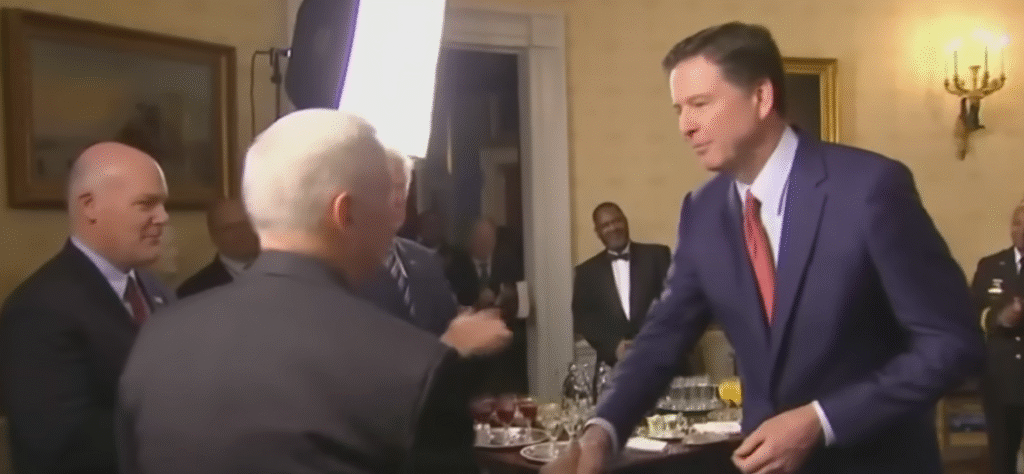One of the most contentious issues in contemporary politics has been reignited by James Comey’s indictment: did the former FBI director willfully mislead Congress in his 2020 testimony? In addition to his reputation, public confidence in the legal system is also at risk at a time when trust in institutions feels particularly brittle. According to the charges against him, which include making false statements and interfering with a congressional proceeding, Comey allegedly misled senators by denying that he had given anyone at the FBI permission to act as an anonymous source. Prosecutors are keen to take advantage of the direct conflict created by his former deputy, Andrew McCabe, saying the opposite.
Given Comey’s long history as a personification of paradox, this case is especially important. He established an independent persona while serving as FBI director under Barack Obama, frequently defying political pressure. But whether he reopened the case days before the 2016 election or announced his conclusions in the Clinton email investigation, his actions changed the political landscape in ways that are still hotly debated. His reputation as a principled but flawed official—one who was adamant about avoiding partisanship but frequently accused of inadvertently tipping the scales—was shaped by those decisions.
The political establishment was shocked when he was fired in 2017 after a disagreement with Donald Trump over the Russia investigation. While Trump’s detractors viewed it as a concerning attempt to weaken checks on executive power, he hailed the moment as a release from what he called disloyalty. Amazingly adaptable in his public persona, Comey rebranded himself as a commentator and author while cautioning about what he perceived to be Trump’s authoritarian inclinations. In his book A Higher Loyalty, Comey played the reluctant truth-teller and depicted the president as “untethered to truth.”
James Comey – Bio & Career
| Category | Details |
|---|---|
| Full Name | James Brien Comey Jr. |
| Date of Birth | December 14, 1960 (age 64) |
| Birthplace | Yonkers, New York, United States |
| Education | College of William & Mary (Chemistry & Religion, 1982); University of Chicago Law School (J.D., 1985) |
| Early Career | U.S. Attorney for the Southern District of New York; Deputy Attorney General under George W. Bush |
| FBI Tenure | Director of the FBI (2013–2017) under President Barack Obama, fired by President Donald Trump in 2017 |
| High-Profile Work | Oversaw investigations into Hillary Clinton’s emails; launched Russia election interference probe |
| Recent Status | Indicted in 2025 for making false statements to Congress and obstruction of a congressional proceeding |
| Publications | A Higher Loyalty: Truth, Lies, and Leadership (2018) |
| Known For | Controversial role in 2016 election; clash with Trump; high-profile testimony before Congress |
| Reference | James Comey – Wikipedia |

Ironically, Comey is currently being accused of lying under oath. Criticizing McCabe’s testimony and bits of contradicting testimony, prosecutors claim that his denial of authorizing FBI leaks in 2020 was willfully false. A 2018 inspector general’s report, however, found that Comey had not authorized such leaks due to the overwhelming weight of the evidence. The new indictment is very contentious because of that earlier conclusion, which casts doubt on the charges’ legality and political motivation.
It is impossible to ignore the political context. Since her appointment during Trump’s second term, Attorney General Pam Bondi has been remarkably active in her pursuit of individuals who were once thought to be Trump’s adversaries. Despite the protests of career prosecutors who felt that there was insufficient probable cause, Lindsey Halligan, a former Trump lawyer who is now the acting U.S. attorney in Virginia, personally approved Comey’s indictment. This sequence has drawn criticism for being a risky deviation from the prosecutorial independence principle, implying that in important legal decisions, loyalty may now take precedence over experience.
However, the indictment is seen by Trump and his followers as a long-overdue justice. In a triumphant response on Truth Social, the former president referred to Comey as “one of the worst human beings this country has ever been exposed to.” Such language illustrates how intricately Comey has been entwined with Trump’s grievances, from the impeachment proceedings to the Russia investigation. For Trump, getting Comey indicted is more than just a legal result; it is symbolic retaliation and evidence to his supporters that perseverance pays off.
Comparisons to past high-profile instances of lying to Congress will unavoidably be made during the trial. Longtime adviser Roger Stone was found guilty before being pardoned by the president, and Trump’s former lawyer Michael Cohen was imprisoned for similar offenses. Although convictions are still uncommon because it is difficult to prove intent, these examples demonstrate how lying under oath can have serious repercussions. Patrick Fitzgerald, the head of Comey’s defense team, is anticipated to highlight the inspector general’s conclusions in support of Comey and contend that McCabe’s credibility is weakened by his own track record of deceiving investigators.
The ramifications extend beyond the courtroom. Comey’s conviction would set a precedent by demonstrating that even the highest ranking officials can face consequences for their dishonesty. His acquittal would support allegations that Trump has manipulated the legal system to target people he considers adversaries. In any case, the trial will determine whether the legal system can continue to be very effective in keeping politics and law apart at a time when they seem to be becoming more and more intertwined.
Even Comey is still defiant. He maintained his innocence and urged Americans not to “live on our knees” in a video statement that was made public following the indictment. His remarks served as both a rallying cry and a personal defense, reminding supporters that he still views himself as a defender of democratic integrity. Beneath that assurance, however, is the indisputable fact that his legacy now rests on the precipice, shaped not only by his past choices but also by his future actions.

